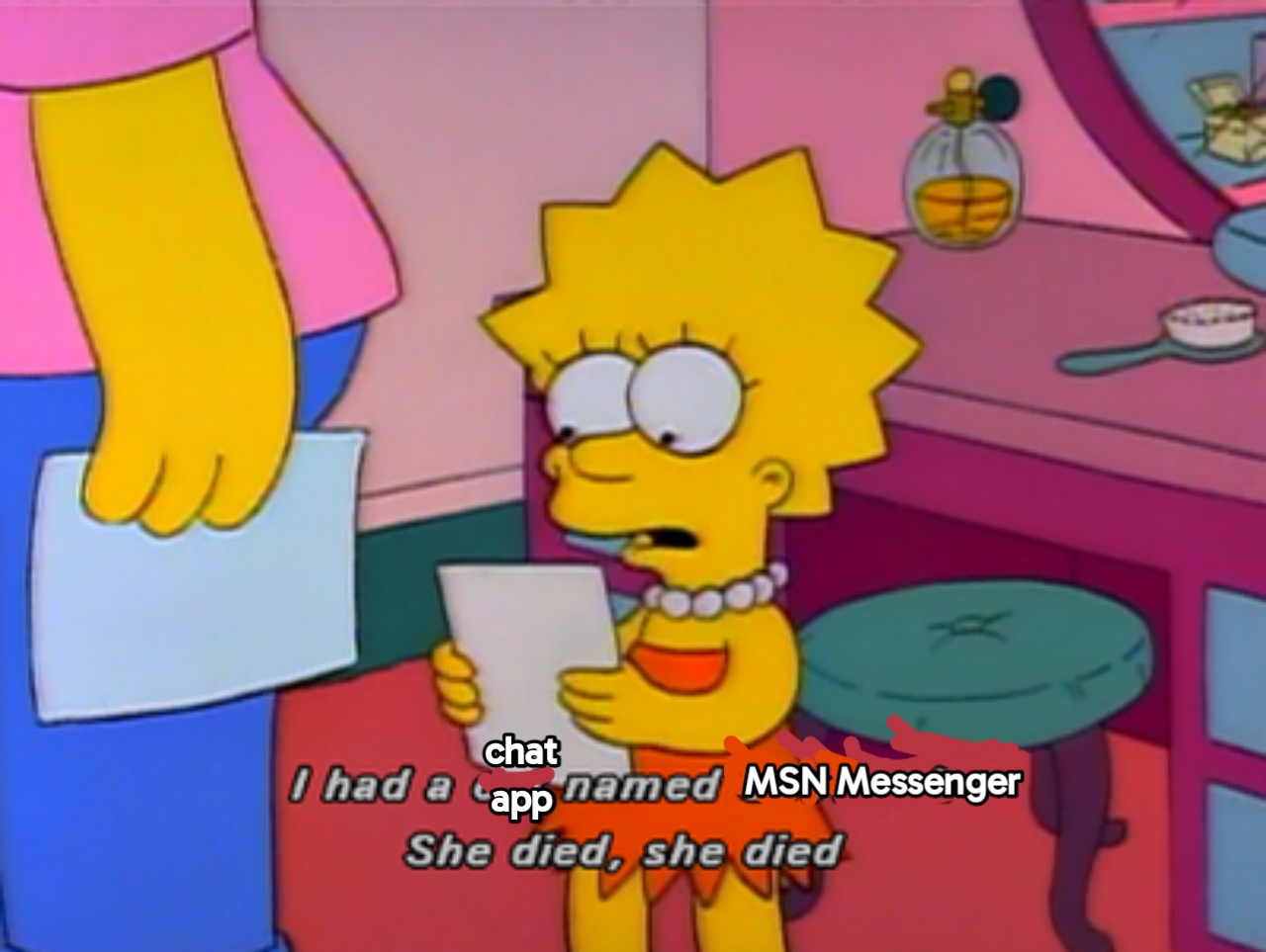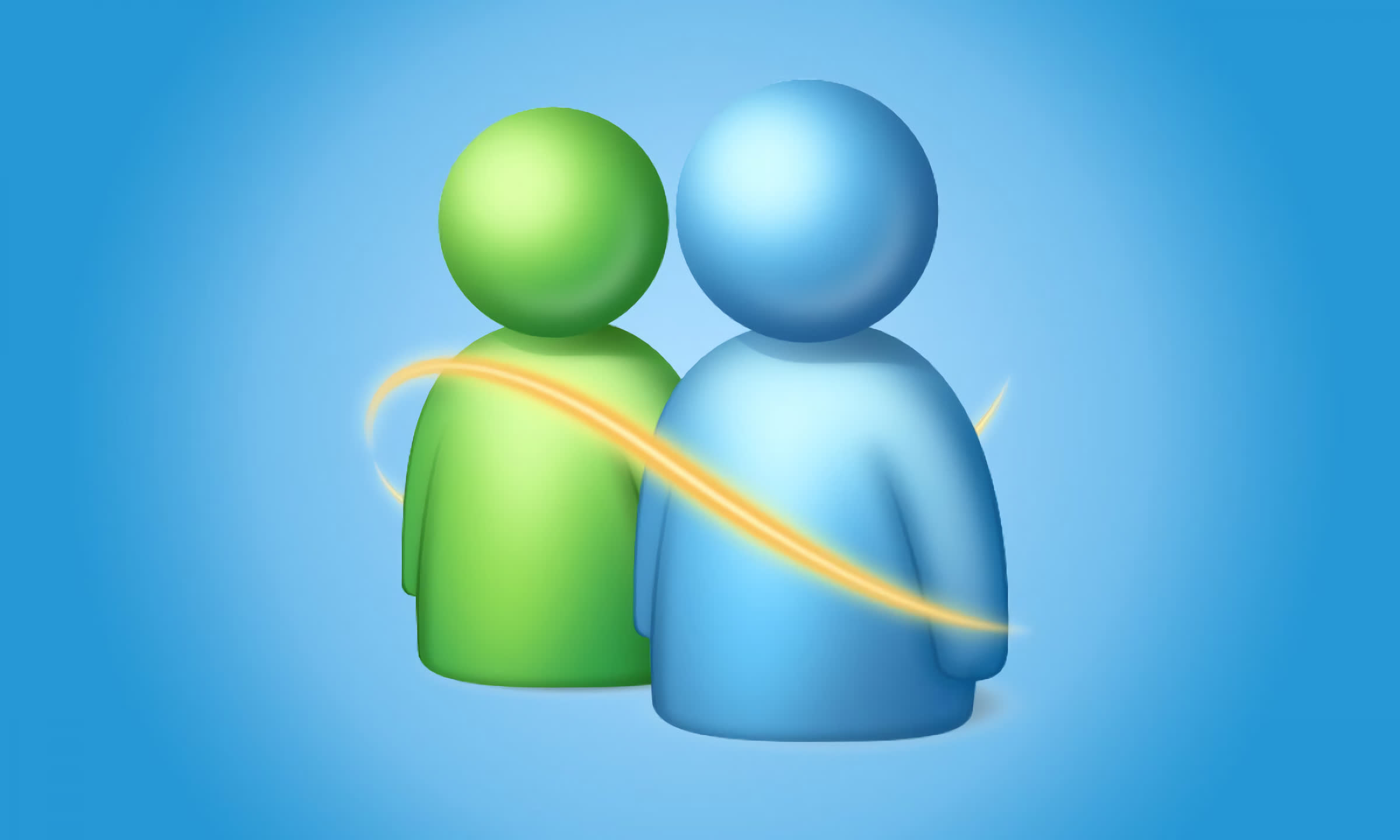The bottom of the article links to the history (individual features) of other IM programs from that era as well like ICQ and Yahoo Messenger.
Microsoft pivoted to Skype. Saved you a click and reading about 1000 words.
Which Microsoft then shit all over (to be fair, Skype started that process even before MS bought them) and eventually renamed it to Microsoft Teams.
And for a while, there was also Skype for Business (formerly Lync (formerly Communicator)).
Yeah that was part of the brand reshuffling they did to obfuscate things. Lync was their shitty chat app they tried to convince businesses to use that everyone hated. They bought Skype, renamed it to Microsoft Teams, renamed Lync to Skype for Business, and killed MSN Messenger. When people still didn’t want to use
LyncSkype for Business, then they killed that as well, and now it’s just MS Teams.Fun fact any developer working with the api can tell you, there is a clear distinction between de voip bit and the meeting/chat bit. They haven’t bothered rewriting or integrating it in any way so the Skype for business backend is still very much alive.
Another fun fact: On the backend, Teams uses SharePoint to store files, and Exchange to store message. The whole M365 stack is a house of cards built on ancient tech. It’s a wonder it works at all.
Lync was such garbage. I used that for years at one of my old jobs. Teams just feels like discord with extra shittiness lol.
The worst part is that they had developed an in-house app that worked amazing but abandoned it for teams.
Still remember setting up lync 2013 for our company. It was one of the funner projects I remember doing. I was not as thrilled about setting up SharePoint 2013…
For a while? Our business used it until … this year. It’s finally EOL this year.
If I remember correctly the Skype for business still identified as communicator on the about page.
The process was skype.exe, so Lync was Skype with a skin.
I have use teams at work and I hate it.
Slack is okay. Teams is full rubbish. I can’t disagree with you. Fuck teams.
I’m so old that I used Skype when it had a red logo.
And the video chats were choppy and black and white and with delayed audio. Those were the days…
Actually, to Lync first. Then Teams. All three suck.
Skype was never meant to replace MSN, even back then everyone complained about it and we talked on teamspeak while playing games.
Yep. I hate clickbait. You’re a legend
I’m surprised no one mentioned Facebook.
I recall using MSN as far as in to 2009, but the friends I was connected with migrated to Facebook when their chat feature rolled out.
I recall using MSN as far as in to 2009, but the friends I was connected with migrated to Facebook when their chat feature rolled out.
another reason to hate facebook
Same, it was pretty much an instant change too. Which sucked as Facebook chat was very unreliable at the time and obviously not very feature rich.
The article touches on that
The advent of social media and mobile devices couldn’t be ignored either. These technologies were enabling new ways for people to stay in touch with friends and family that didn’t involve a traditional computer.
From my ignorant point of view Microsoft had in its very own hands a solid competitor to Facebook but ended doing absolutely nothing with it.
I still can recall the MSN/Hotmail profiles - it was kind of a news feed that recorded all your statuses from MSN (or you could add your own there). Your contacts could add comments on those. I seem to recall at some point you could add posts with pictures too.
But all of that just disappeared when they ditched MSN.
They could’ve beat Facebook in its own game easily, as they had the advantage of their huge userbase - but somehow they missed on that too.
Trillian gang
Anyone remember the short-lived Great War of the Messenger Apps? For a few months back around… '98? '99? MSN tried really hard to shoehorn its way into working with AIM. About every day there would be an update from MSM Messenger to allow it to work with AIM. Then AOL would fuck with their own protocol to ice out MSN users again.
I think these shenanigans also impacted the Trillium Messenger app too, which up until then had been flying under the radar of messenger interoperability.
I might be getting some of these details wrong.
And then Jabber came to fix it by introducing an open protocol, and Google started supporting it, and all was well. But when everybody was using Google Chat they severed the Jabber compatibility, locking everyone in to their platform. Now we’re back wading around in enshittified shit and Jabber is dead.
Support matrix!! It already has international support, just needs to be a bit better with stickers and qol stuff. I’ve been using it for years. It’s nice to know I don’t have to worry about my privacy at all with chat rooms that can continue on without the original server.
It was promoted to me as a contender for Slack / IRC, not for the kind of direct messaging app that ICQ / MSN messenger was.
I wouldn’t say jabber is dead, xmpp is still pretty well used. Not enough IMO, but still in use and with readily available modern servers. Jitsi is xmpp+jingle (sip signalling) after all.
People blame Google for the death of jabber because of one blog post from a disgruntled contributor but the truth is jabber was never popular and Google chat died as well.
Jabber was a mess, most of the clients were barely compatible with Each other and it was a wild west of feature support. Some clients were well featured with the ability to send richer messages, but typically only worked with a specific server and the same clients. Jabber did a crap job at making sure clients and servers interacted properly with each other and didn’t push the standards quickly enough, forcing clients to do their own thing.
Which is all Google did, they went their own way because nobody used jabber and the interoperability was causing more harm than good. It didn’t work, Google talk died and many years later clients like WhatsApp took over instead.
facebook, google talk, etc. all relied on the XMPP protocol. you could add your facebook messenger friends to google talk or any of the open source clients like pidgin. it was the holy era of instant messaging. federated. solution. no bullshit lockdown to a specific system like in the days of ICQ, Skype, etc.
then both facebook and google talk locked down their XMPP server and i lost 80% of my friendlist on XMPP. and that was that. i had to get facebook. i had to get google mail. especially relevant when microsoft bought skype and it turned to shit.
guess what. today we’re split on even more clients than we used to be. need signal, whatsapp, facebook messenger, telegram, discord, band, matrix, threema, session, irc, slack, and steam chat installed on my fucking device. and all because meta and google pulled the rug to isolate their systems and force user conversion.
no, thanks. open source federation is the only solution to unshitification and that’s never going to happen as long as people do shit like leaving x for bluesky instead of mastodon etc. leaving facebook for band instead of literally any other fediverse platform (because facebook has devolved to ads and facebook groups - everything else is irrelevant or dead on there). etc etc.
Have you tried Matrix?
I used that until they pay walled it. Then I found Pidgen I believe it was called. It was open source and could connect to pretty much every messenger and IRC and stuff. Then my friend just switched to texting lol
Pidgin. Before that it was called Gaim.
It still works, as there are plugins to integrate it with almost everything.Gaim was the way I used MSN from Linux back in the day.
I miss that era.
I knew it wasn’t spelled exactly like the bird lol. But yeah I used that shit for years. I don’t really have a use for it anymore or I’d probably still be using it
I used it all the way up until Google broke compatibility with it, then continued using it with a third party plug-in until that stopped being maintained.
Now I prefer Signal over Chat.
“A pidgin /ˈpɪdʒɪn/, or pidgin language, is a grammatically simplified means of communication that develops between two or more groups of people that do not have a language in common: typically, its vocabulary and grammar are limited and often drawn from several languages.”
Oh that’s cool. I didn’t know that. Thanks for sharing!
Always thought it was a great name choice.
Trillian was definitely part of that war. I remember the daily patches to get things working again.
Trillium
Trillian, not trillium. And they’re actually still around.
I think the article mentions it. AOL tried to block it and this to and fro went 21 times before finally coming to a stop. MSN and Yahoo later signed a deal, I think, so that the former will work with latter’s contacts properly.
I might have been 10 minutes too young for ICQ. I think that’s what the college kids were playing with when I was in high school. For my cohort it was the big three: MSN, Yahoo! and AIM. You probably had all three installed on your computer and probably all running at once. They’re probably why my entire generation can touch type. Vital tool for teenage social life at the turn of the century.
This was Microsoft’s era, too. The main reason Apple survived the 90’s was because Microsoft invested in them to counter anti-trust allegations. They paid Apple to keep existing so they couldn’t be called a monopoly. Internet Explorer was the web browser, any others in use were a rounding error. No one had a Mac, a few people were still clinging to their Amigas. THE platform for personal/home computing and internet access was a Pentium PC with Windows ME or XP, which came with MSN Messenger out of the box.
Two things happened nearly simultaneously: Facebook Messenger and the iPhone. Graduating high school in 2005, your freshman year of college you probably started hearing about the cool new site that’s kinda like MySpace except it’s only for college kids. By your junior year all your new college friends were on Facebook and all your old high school friends that never logged on let alone talk to you were on MSN. And if you graduated in 2005, your junior year was in 2007, the year the iPhone was launched. MSN Messenger had been present as baked in “functions” of certain media phones at the time, but I don’t think they ever made it to the App Store or even the Play Store on Android. Facebook was fast to adopt mobile apps, and for awhile there it was the one messenger service that interoperated between desktop on a web browser and smart phones across platforms. SMS didn’t run on the desktop, iMessage is Apple-only, AIM, MSN and Yahoo were nowhere to be found and Telegram, Signal, Discord etc. weren’t around yet. So everyone standardized on Facebook Messenger.
Meanwhile, Microsoft bought and ruined Skype.
As a diehard Netscape Navigator user, I scoff at your browser choice.
The running joke in my day was everyone used Internet Explorer… to download Netscape.
In 2003, Internet Explorer had a 95% market share. Your running joke was demonstrably untrue.
Some of us are older than you think we are
I mean, you name dropped Netscape. Your next of kin is probably rehearsing the talk where they take your car keys away as we speak.
The topic of discussion is MSN Messenger, its popularity and demise, which puts us in the period between 1999 and ~2008. Especially during the first half of that decade, practically everyone was using IE. And not really liking it, but using it nevertheless.
deleted by creator
You nailed my experience. Though AIM was preferred. I begrudgingly used MSN too for a couple people who weren’t allowed to install AIM.
Those were the days. 🥲
Nudge
Wizz
Oh what a relief it is
It was awesome. Especially paired with the msn messenger plus mod.
Near the end of its time and also when WiFi was taking off, I had friends with everyone in a uni house, but their WiFi was quite unreliable, so every hour or so I’d get 6 “person is online” pop up toasts appear simultaneously, stacked up on top of each other.
Microsoft Teams is sorta like the all grown up version of MSN, with the colour drained from it and “fun” features out of the box feeling dead on the inside
Just like a real adult human
well, the same as the others really: Time.
I think once SMS and phone apps became the norm over having Messenger apps on our Desktops all the time, that was pretty much it for these applications over all. It was a long, slow death. But MSN was one of the firsts to call it quits if I recall right. Oddly the IM app I liked the most. It’s just not many of my friends used it. They were all AIM/AOL users.
The one thing these messengers had over texts was presence notifications. I remember jumping through hoops to get aim working on my Motorola v188 so that I could be notified every time my crush came online and I could send her a “hey what’s going on”… only for it to be ignored.
I miss Adium, I used it for a bunch of protocols, and I customized the CSS/html to make it look really awesome.
I had an app called snakeskin or something to skin my Mac OS X to be dark themed.
Wow, that’s a name I haven’t heard in a long time.
Adium was awesome, that was the golden age of computing and the internet in my opinion.
With Linux and other FOSS projects surging in popularity, I dare say we’re in for another.
But, sadly, companies don’t seem too interested in making good software for that sake of it being good anymore. Now it’s all about getting you hooked on an eternal subscription.
I certainly hope so. It’s been great seeing PopOS and Linux Mint pushing the bar on what a good linux desktop experience can be.
I’d love to see Linux become a stronger competitor to macos (which is what I’ve used for almost 20 years).
Absolutely adore PopOS. I can’t wait for cosmic to be finished!
The smart phone/blackberry i assume killed a lot of the IM apps
It was very popular within my friends up until the skype merger. At that point they went “i aint usin skype lmao”
deleted by creator
I never knew anybody who used it. I had one contact on ICQ. Everybody else used AIM.
I was in highschool in the 2000s in Europe, and msn was our default way of communication with classmates.
Yep, early 2000s in the UK and everyone was using MSN. I didn’t know a single person using AIM or ICQ!
I can see why AIM would be mostly an American phenomenon, given it was initially a feature specific to AOL. ICQ…I like to say I’m 10 minutes too young to have used ICQ, everybody who has wistful memories of it were like the seniors when I was a freshman. Yahoo! was the other one; the perpetual alsoran.
Ditto for us in Australia
Remember when icq could message aim users though? That was so badass.
remember trillian? or pidgin was it called? you could message every service.
that was badass.
I actually forgot all about that, but yes I did use Trillian at one point. Can you imagine big tech companies letting you use third party apps that didn’t lock you into their service or ad stream these days?
Both. Trillian was not Mac only (I made a mistake from memory), Pidgin was multi platform but started on Linux. Pidgin had every protocol. I still keep my .purple config folder and logs after over a decade. Not like I’ll ever read the logs again, though.
Edit: Guys, relax. I made a mistake recounting from memory. I didn’t run Windows back then. I assumed that because of the native Aqua interface, there wasn’t a Windows port.
I remember having Trillian on Windows way back when.
I’ll have you know I did go back and read my logs from like 2008. I think I cringed so hard I never recovered. You might have saved yourself by not looking at yours!
Trillian was not Mac only. I’ve never owned a Mac and used Trillian almost exclusively from 2002 until roughly 2009?? I can’t remember when the transition from IM to texting happened for me, but it was around then. When I was running Linux at home I would use Gaim, which was developed by a friend of the main Trillian guy.
Trillian ran on Windows but was closed source. Pidgin is foss.
MSN could do the same with Yahoo Messenger users, for a while at least.
I think this is another one of those cases where the US does something different to the rest of the world: the majority of people were using msn messenger but the US was using aim.
AIM was released in 1997, MSN in 1999. AIM was at the time the biggest ISP in the United States, so AIM was pretty uniquely marketed to us.
It was my observation that you had two main camps: Those whose home was AIM, and those whose home was MSN. And the deciding factor was probably if you used AOL as your ISP. There were people who didn’t know you could get an AIM account if you weren’t an AOL customer. Those who didn’t use AOL probably went the same way others did around the world, MSN messenger was built into Windows so it was the obvious one to use.
In the UK MSN was pretty ubiquitous.
I don’t even know what AIM is, everyone in Brazil was on ICQ and MSN, if you were a kid or teen you were on MSN, if you were an adult you were on ICQ.
AOL Instant Messenger, ICQ’s main rival in the 90’s in North America.
No mentions of XMPP 😒
Thinking in terms of platforms is much easier for the knuckle draggers.
Ah, sorry. Us peons aren’t used to being in the presence of master intellects such as yours. Truly, we are not worthy of your attention, o wise one.
How silly of us to talk about MSN on a submission about MSN.
Messenger-> Office Communicator -> Lync -> Skype for Business -> Teams. https://en.m.wikipedia.org/wiki/Skype_for_Business

That’s ok, we have teams now
give me back messenger. at least it was a cohesive usable app.
teams is just a low budget email emulation machine that still fails to deliver a functioning inbox, much like outlook.
I’d rather drag my dick through HIV riddled discord memes then use that rotting pile of shit called teams.
The browser versions of teams and outlook are surprisingly stable. The desktop software for both are beyond broken.
I agree, though stability doesn’t make an app usable.
True, but it’s the only thing you can do if your company forces you to use them…
Fuck all y’all…I like teams, for work.
oof :´(
Good old days.
The letters in bold spell “gold”, just in case you didn’t see it.
I did it myself lol
Good job
I remember I started using more Skype after it MSN Messenger.
But I’d say it got killed by WhatsApp on mobile phones.





























